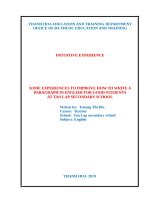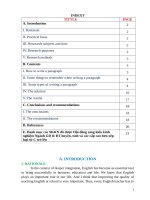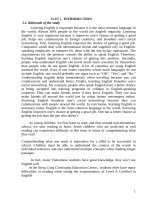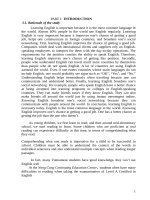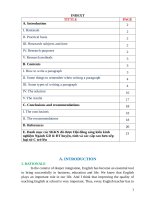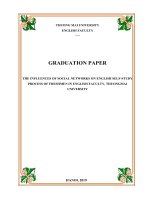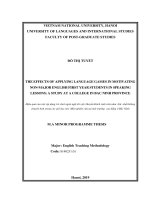- Trang chủ >>
- Cao đẳng - Đại học >>
- Luật
GRADUATION STUDY b a DEGREE IN ENGLISH
Bạn đang xem bản rút gọn của tài liệu. Xem và tải ngay bản đầy đủ của tài liệu tại đây (613.16 KB, 51 trang )
MINISTRY OF EDUCATION AND TRAINING
HO CHI MINH CITY UNIVERSITY OF LAW
GRADUATION STUDY
B.A. DEGREE IN ENGLISH
Major: Legal English
HOW TO WRITE LEGAL ENGLISH EFFECTIVELY
WHEN LACKING SUFFICIENT LEGAL BACKGROUND
Supervisor: Phan Le Chi, MA
Student: Le Thi Hoang Chau
Student ID: 1652202010012
Class: LE41
Ho Chi Minh City, 2020
ACKNOWLEDGEMENT
When I was a sophomore, I read a few excellent graduation theses of other
students. I thought I would never have a chance or ability to conduct a thorough study
and express my ideas or opinions as well as those students had done. However,
everything happened in the way completely contrary to what I thought. I became one of
the students qualifying for doing a graduation study. I was nervous and eager for what I
need to do to complete my study successfully. When I received the list of topics, I chose
this study topic because it caught my attention immediately. In addition, I felt very lucky
when I knew my supervisor was Ms. Phan Le Chi. She is one of the lecturers that I have
always admired since I had a chance to attend her courses on legal writing and broaden
my knowledge by virtue of her unique teaching method and extensive experience.
During the process of doing this study, she wholeheartedly supported me in providing
information that I could not find on my own. Moreover, she also gave me useful advice
and comments for my papers. Therefore, I would like to express my deepest thanks to
her because what she did has greatly contributed to the success and completion of my
study. Additionally, I would be glad to show my gratitude to all the lecturers who were
in charge of the courses I attended since my study also applies skills and knowledge that
I have learnt from them.
I am especially grateful to my friends, Tran Nhu Quynh and Bui Tien Phat. They
always stay by my side, support, and encourage me to accomplish something
challenging in the final year at university. Furthermore, they also gave me a number of
books and references that I could never find on my own. What they have done really
strengthens my motivation to overcome difficulties in writing this study. Moreover, I
would like to give my warmest thanks to Vo Minh Nga and Le Nguyen Phuong Quynh.
They helped me make my study better by proofreading it to review the contents and spot
all mistakes that I could not realise by myself.
LIST OF ABBREVIATIONS
Ed. – Editor;
ed. – edition;
n.d. – no date;
p. – page; and
pp. – pages.
LIST OF TABLES
Table 1.1: Specific types of legal texts in informative writing – Law office
memoranda……………………………………………………………………………. 8
Table 1.2: Specific types of legal texts in informative writing – Letters……………... 9
Table 2: Specific types of legal texts in persuasive writing…………………………... 10
Table 3.1: Specific types of legal texts in planning and documentary writing – Wills and
contracts……………………………………………………………………………… 11
Table 3.2: Specific types of legal texts in planning and documentary writing –
Constitutional documents and case briefs……………………………………………. 12
Table 4: Expressions about rights and duties………………………………………… 38
TABLE OF CONTENTS
INTRODUCTION .........................................................................................................1
1. Background study and study question .............................................................1
2. Study objectives ...............................................................................................2
3. Scope of study ..................................................................................................2
4. Literature review ..............................................................................................3
5. Study methodologies ........................................................................................4
6. Structure of study .............................................................................................5
CHAPTER ONE: GENERAL INTRODUCTION OF WRITING LEGAL
ENGLISH .......................................................................................................................6
I.
What is writing legal English? .........................................................................6
II.
Types of legal English writing .........................................................................7
III.
The standards of a good piece of legal English writing .................................13
IV.
The impacts of good or bad legal English writing .........................................15
CHAPTER TWO: LEGAL BACKGROUND IN WRITING LEGAL ENGLISH
.......................................................................................................................................17
I.
How much is sufficient legal background in writing legal English? .............17
II.
The impacts of lacking sufficient legal background on writing legal English
........................................................................................................................20
III.
How do legal writers have sufficient legal background? ...............................21
CHAPTER THREE: METHODS OF WRITING LEGAL ENGLISH
EFFECTIVELY WHEN LACKING SUFFICIENT LEGAL BACKGROUND ..24
I.
Prewriting stage ..............................................................................................24
II.
Writing stage ..................................................................................................33
III.
Editing and proofreading stage ......................................................................40
CONCLUSION OF THE STUDY .............................................................................42
I.
Summary of study ..........................................................................................42
II.
Limitations of study .......................................................................................43
III.
Suggestions for further studies .......................................................................43
INTRODUCTION
1.
Background study and study question
Regarding learning general English, writing is one of the most important
productive skills. Writing reflects the process of thinking, because it usually requires
writers to transfer what they think in mind to written form with well-organised order of
ideas. However, the majority of people rarely prefer practising this skill set, because
they find it more challenging than the others. They usually write long and rambling
essays, since they do not know the effective ways to go through the whole writing
process. They usually skip most of the preparing stages and write down any sudden idea
in their mind immediately. Consequently, their essays can be obscure and illogical.
In applying English to the field of law, having good writing skills is strictly and
commonly required, because the wrong use of words or punctuation marks can change
the meaning or cause ambiguities, leading to serious legal consequences. In reality, legal
writers also have the same problem with writing in general English, which usually leads
to complicated texts. Additionally, due to the academic nature of law, writing requires
final documents to be suitable with different legal contexts. As a result, legal workers
frequently face the problem of getting accustomed to all types of legal texts. In addition,
there is also another main difficulty. It is having no or little legal background about a
particular legal area. This problem results from the widely-held perception. In particular,
when discussing something about law, most people tend to believe that all legal writers
must have intensive knowledge of law or remember every single legal regulation applied
to solve a legal issue. However, in fact, the majority of people working in legal field
hardly have sufficient legal knowledge. What they usually need is skills to analyse and
understand legal principles to apply in writing appropriately. Unfortunately, even a lot
of legal workers, especially those who are inexperienced, do not realise this fact. As a
result, with such mindset, they become afraid of writing and do not know how to gain
their own sufficient legal background to produce legitimate and well-organised papers
to accomplish certain purposes and bring benefits for clients. Therefore, it is urgently
necessary to know how to write legal English effectively when lacking sufficient legal
background.
1
In Vietnam, the demand of using legal English in field of law is presently getting
higher and higher due to the rapid and sustainable development of foreign investment
as well as the integration of Vietnam into the global economy. For this reason, legal
learners or professionals are trying to improve not only their legal English but also legal
writing skills in English. Unfortunately, they usually have problems in finding the most
appropriate source about writing legal English. Although they have to work under
Vietnamese law or civil legal system mainly, the majority of available references or
publications are based on American or common law. The differences in nature of the
two systems impact the steps of searching for applicable laws and writing, which
consequently impedes progress in writing skills for Vietnamese people studying and
working in legal field. Therefore, this study will focus mainly on writing legal English
in Vietnamese legal system.
Throughout the study, four study questions can be raised in order to discuss this
topic fully. The study questions are:
-
What are the standards of the good writing of legal English? What impacts
does the lack of sufficient legal background have on writing legal English?
-
How can they make it sufficient during the writing process?
-
What are the most effective methods or strategies to write in case of
lacking knowledge about law for Vietnamese legal practitioners?
2.
Study objectives
The study aims to investigate all the issues mentioned in the study questions. In
addition, it will propose suitable and efficient methods of resolving the problems of
writing legal English in case of having no or little background in legal field for legal
workers or learners in Vietnam.
3.
Scope of study
This study focuses on suggesting methods of writing in case of legal background
shortage. Moreover, in order to suggest efficient strategies, it is necessary to understand
some legal aspects relating to the topic. They include (i) the definition and specific types
of writing legal English; (ii) the understanding of sufficient legal knowledge and its
impacts on writing legal English. Accordingly, this study will also cover such aspects,
allowing readers to understand the reason why certain methods are suggested.
2
Furthermore, this study will also primarily cover certain methods to suit the nature of
the legal system in Vietnam.
4.
Literature review
For the last few decades, a number of authors have been discussing the
importance of legal background in legal English writing. The large majority of their
publications have a similarity in highlighting the importance of conducting legal
research to find applicable legal principles.
Edwards (2018) focuses on proposing specific methods of writing briefs, letters,
and memoranda in her publication, Legal Writing – Process, Analysis, and
Organisation. Particularly, the author incorporates the steps of finding legal rules into
the process of writing each type of legal texts. Moreover, the publication clearly states
that the step of searching for legal regulations in writing briefs is different from that in
writing memoranda. Nevertheless, this book imposes a limitation on the general process
of conducting legal research to find applicable rules. Specifically, as it solely discusses
writing process of briefs, letters, and memoranda, readers can easily assume that legal
writers only need to conduct legal research when writing these three legal texts.
Consequently, it does not give the general process to find legal rules to write legal
English in the most effective way.
Unlike Edwards, Bast and Hawkins (2010) have a different approach to the
process of gaining adequate legal background. Before giving steps of legal research,
they indicate the necessity of understanding a legal system thoroughly. Therefore, their
publication, Foundation of Legal Research and Writing, gives specific information
about the American legal system and two sources of law, including a primary source
which is laws like constitutions, cases, or administrative regulations; and a secondary
source which contains commentaries on the law, such as legal review articles.
Subsequently, they provide eight steps of study to locate legal rules in accordance with
the identified legal sources. Moreover, they do not focus on giving any different process
of legal research for different types of legal texts. This means they make an effort to
give the most general process of searching for legal rules so that readers can apply it in
almost all contexts of writing.
3
Another source of legal writing is Legal Reasoning and Legal Writing
(Neumann & Tiscione, 2013). The authors base on American legal system and describe
their perception of legal writing which should include the general understanding of final
products (how the final writing looks, what it accomplishes, and so on) as well as writing
process. Moreover, they also emphasise the importance and the difficulty in legal
research of written legal documents. Consequently, in their publication, they focus on
discussing both components and process of studying enough information or legal
regulations before producing certain legal English writing, especially letters and
memoranda. Similarly, in Legal Research and Legal Writing for Paralegals, Bouchoux
(2016) strongly emphasises the significance of doing legal research before giving
various methods of writing in law practice. Following Bouchoux, Samborn and Yelin
(2016) have developed their publication, Basic Legal Writing for Paralegals, to indicate
how to determine legal authorities or governing laws and use them appropriately as
adequate preparation before starting to write.
Overall, at the moment, most of the available publications relating to writing
legal English mainly discuss three matters, including (i) the American legal systems and
sources of law, (ii) steps of legal research, and (iii) writing process. Most authors
strongly emphasise the necessity of legal research to gain sufficient legal foundation for
writing effectively. However, these present publications are based on US or common
law system. Additionally, there are very few books about writing legal English based on
civil law system. This leads to the difficulties for Vietnamese legal learners or
practitioners in finding the most appropriate methods to gain sufficient legal background
and write effectively. The reason for this is that the nature of these two law systems is
distinguishable. Consequently, the process of legal research in civil law system can be
different from that in common law system.
5.
Study methodologies
There are several study methodologies that will be applied throughout the study.
Firstly, the qualitative study method will be applied to convey definitions or
characteristics of writing legal English. Secondly, in accordance with the synthesis
method, the study will summarise several relevant studies or publications of various
authors on the same question. In addition, the study will also use the analytical study
4
method to analyse and evaluate other available sources of materials or references
relating to writing legal English.
6.
Structure of study
Chapter One: General introduction of writing legal English
Chapter Two: Legal background in writing legal English
Chapter Three: Methods of writing legal English effectively when lacking sufficient
legal background
5
CHAPTER ONE: GENERAL INTRODUCTION OF
WRITING LEGAL ENGLISH
This Chapter aims to give a brief overview on the concepts of legal English and
writing legal English. In addition, it also discusses standards of a good piece of legal
English writing as well as negative or positive impacts on both writers and readers.
I.
What is writing legal English?
When using legal English, legal writers should pay attention to develop the
ability to write well because this is one of the most frequently used skills in law practice.
In Vietnam, the importance of writing legal English is so tremendous that Vietnamese
legal practitioners should pay even more attention to sharpen their skills. The reason is
that legal writing in the first language is already difficult. This means legal writing in
English is definitely far more challenging. Therefore, it is necessary to know what
writing legal English is and its fundamental role in law practice.
Writing legal English is considered a process of creating legal documents in
English. This process includes three main stages, from planning for content, to writing
in a readable way, to reviewing and revising thoroughly (Bast & Hawkins, 2010, p. 281).
Each of these stages contains a range of skills legal practitioners should acquire in order
to produce legally effective documents. In particular, writers always need to go through
the prewriting stage to prepare for the contents of their writing. It requires them to have
necessary skills to identify main legal issues of a case, study, analyse relevant and
applicable legal principles, and then outline or arrange fundamental points logically to
give final legal answers. This very first stage contributes profound effectiveness to the
second stage when people begin writing, because adequate preparation allows them to
know exactly what they should write about and avoid wandering away main legal issues
which need discussing. Subsequently, in order to create the readable writing, writers
should possess skills to write logically, use the most appropriate legal English terms,
avoid wordiness and ambiguities by not using too many meaningless words or
complicated structures. Finally, the stage of reviewing and revising urgently requires
writers to know how to properly edit their own legal English writing objectively in order
to spot errors throughout the writing.
6
Writing legal English is a vitally important skill set for several reasons. One of
them is that almost all legal writers have to deal with writing documents frequently. For
instance, there is a meeting or a phone call with clients or contractual negotiation
between parties. Subsequently, legal writers need to write a follow-up email or letter
with the aim of summarising and restating the content of the discussion, or carefully
draft a contract to convey parties’ will exactly (Krois-Lindner, 2011, p. 86). From this
example, it is deducible that legal writing is used in almost all cases even when a
discussion is oral. In addition, legal writing requires legal writers to be able to write
various types of documents with distinct purposes compatible with different legal
contexts. Secondly, at the present, writing legal English well is important to meet
foreigners’ increasing demand in finding a legal professional with a good reputation. In
particular, when operating business or conducting any transaction in another country
where people use a different language and legal system, foreigners want to ensure there
will be very few legal problems potentially arising from any legal documents related to
their business. Therefore, they will find legal writers who are excellent at using English
in legal writing to give practical assistance and help them feel secure about doing
business.
Overall, writing legal English can be defined as a three-stage process of
producing English legal documents with appropriate skills at each stage. The importance
of writing legal English is undeniable because it is one of the tasks legal practitioners
have to deal with regularly. In addition, writing legal English well is crucial to meet
increasing demand of foreigners in the context of social and economic integration.
II.
Types of legal English writing
Legal writers have to deal with various types of legal English writing. Different
types have their own function to fulfil writers’ aims of writing. Therefore, the most
common criterion for classification is the function of written texts or documents.
According to this criterion, legal writing can be classified into three broad categories
(Bast & Hawkins, 2010, p. 276; Edwards, 2018, p. 35):
-
Informative writing;
-
Persuasive writing; and
7
-
Planning and documentary writing.
The first category is informative writing. Its aim is to inform readers specific
information related to certain cases, disputes, or legal transactions. It can be considered
one of the most common types of legal writing since its function is clearly manifested
in the two most common legal texts, including law office memoranda, and letters. These
types of legal texts can be analysed in the following table:
Types of
Legal context
legal texts
of writing
Law Office
- When
Memoranda clients
need
consultation with a
law firm about a
dispute
or
a
transaction,
attorneys need to
assist other legal
professionals
in
finding the best
way to advise or
represent the client.
Function
- To
inform
about:
• Results of a
legal
research,
including strengths and
weaknesses of dispute
or transaction for the
client’s
position
(Samborn & Yelin,
2016, p. 130); and
• Predictions of
outcomes
of
any
possible decision by
means of the legal
research.
Reader
- Other attorneys
(as primary audience)
– Because attorneys
need to know the
advantages
and
disadvantages of the
case to represent their
clients in the best way,
or to help to save the
client’s time and
money when there are
fatal weaknesses; and
- Clients
(as
secondary audience) –
Because
clients
should see the big
picture
of
their
situation to make an
informed
decision.
(Samborn & Yelin,
2016, p. 130)
Table 1.1: Specific types of legal texts in informative writing – Law office memoranda
8
Types of legal texts
Letters Client
Opinion
Letters
Legal context
of writing
- When
attorneys have
to
answer
clients’
questions
relating
to
certain
legal
issues; or
- When
following up an
oral discussion,
attorneys
usually need to
write clients a
letter to confirm
discussed
information
(Bast
&
Hawkins, 2010,
p. 295; KroisLindner, 2011,
p. 86).
Transmittal
- When
Letters (Bast attorneys want
& Hawkins, to
send
or
2010, p. 293) explain
any
further
document
or
related issue;
and
- When
attorneys direct
further actions
(Bast
&
Hawkins, 2010,
p. 293).
9
Function
Reader
- To inform about:
• Information
(including given facts,
favourable
or
unfavourable law, and
explanation of how it is
applied), or advice after
attorneys
have
conducted a
legal
research carefully; and
• Information
discussed
in
the
meeting
with
the
clients.
- To
document
information
legal
writers have given,
protect them from
problems
of
misconstruction, and
prove
they
have
fulfilled
their
professional duty (Bast
& Hawkins, 2010, p.
295).
- To inform about:
• Explanation for
further documents or
related issues clients
need to know; and
• Direction
for
further actions.
- To
document
information
legal
writers have given,
protect them from
problems
of
misconstruction, and
prove
they
have
fulfilled
their
professional duty (Bast
& Hawkins, 2010, p.
293).
- Clients
who need to
know
the
answer to their
question.
- Clients;
and
- Third
parties.
Table 1.2: Specific types of legal texts in informative writing – Letters
Secondly, persuasive writing is another popular type of legal writing most legal
practitioners have to deal with. By nature, memoranda of law and appellate briefs are
widely known as the two most common legal texts with the purpose of convincing
deciding authorities to favourably rule a case for clients (Neumann & Tiscione, 2013, p.
31; Edwards, 2018, p. 36). Furthermore, persuasive writing can also take a form of
letters used to convince clients to take legal advice for their best interests. These three
most common types of legal texts in persuasive writing can be analysed as follows:
Types of legal
Legal context of
texts
writing
Memoranda
of
- When attorneys
law
represent clients at a
trial court and want to
convince a judge to rule
in favour of their
clients.
Appellate Briefs
Function
Reader
- To persuade
- Trial
judges at trial court courts.
to
favourably
decide a case for
clients (Bast &
Hawkins, 2010, p.
353).
- To persuade
- Appellate
judges at appellate courts.
court to decide the
case again in favour
of the petitioner.
- When parties are
not satisfied with the
decision of the trial
court, they can file
appellate briefs to have
the case decided again.
Letters
- When attorneys
- To persuade
- Clients,
want clients to follow clients to follow and
their legal advice for the their legal advice;
- Opposing
clients’ best interest; and
parties or third
and
- To persuade parties.
- When attorneys opposing parties or
want to ask opposing third parties to meet
parties or third parties certain
to do certain things requirements
in
indicated in the letter, order not to be
otherwise their clients sued.
have to file a lawsuit
against them (Bast &
Hawkins, 2010, pp.
277-278).
Table 2: Specific types of legal texts in persuasive writing
The last category of legal writing is planning and documentary writing
(Edwards, 2018, p. 35; Bast & Hawkins, 2010, p. 278). Basically, when doing this type
10
of writing, legal drafters aim to plan potential legal events in the future and legal
consequences, to record certain information of transactions as evidence for possible
disputes, or simply to record legal contents. In particular, these purposes are commonly
demonstrated in wills, contracts, case briefs, and constitutional documents (Bast &
Hawkins, 2010, p. 278).
Types of legal
texts
Contracts
Legal context of
Function
Reader
writing
- When attorneys
- To
plan - Parties to
assist clients in drafting adequate rights and contracts; and
contracts with another obligations of each - Interpreters.
party.
party;
- To plan certain
behaviour
which
constitutes a breach of
contracts, as well as
compensation; and
- To serve as
evidence
for
interpretation
or
possible disputes.
Wills
- When attorneys
- To plan how - Heirs;
assist clients in drafting inheritance is divided; - Close relatives
wills to plan what will
- To serve as of testators; and
happen to clients’ legitimate records of - Other related
property after they die. testators’
will
to people of wills.
divide their own
property before dying.
Table 3.1: Specific types of legal texts in planning and documentary writing – Wills and
contracts
11
Types of legal
Legal context of
texts
writing
Constitutional
- When attorneys
documents
assist clients in drafting
documents necessary or
compulsory
for
business operations of
several legal entities.
Case briefs
- When
legal
writers want to help
readers understand a
case clearly with no
need to read the whole
case
(Krois-Linder,
2011).
Table 3.2: Specific types of legal texts
Function
Reader
- To document - Members of an
certain contents in entity; and
memoranda
of - Other related
association (including people,
e.g.
information of an shareholders.
entity’s existence, its
organisational
structure, rights and
obligations of its
members),
or
in
charters
(including
controls
and
regulations on an
entity’s operations).
- To summarise - Other legal
and document main writers; and
facts, legal issues, - Clients who
judgements of courts, want to picture
relevant laws, and a likely results of
brief explanation of their case by
how the laws are acknowledging
applied in the case.
similar cases.
in planning and documentary writing –
Constitutional documents and case briefs
Even though legal writing can be classified into three categories, they cannot be
completely separated. Specifically, when legal practitioners do informative writing,
their legal text does not necessarily have an informative function solely, but it can also
have a persuasive purpose. Client opinion letters can be taken as a prime example. In
particular, after receiving clients’ questions and conducting a legal research, lawyers
usually write clients letters to give them detailed answers. In addition, lawyers usually
advise on the optimal solutions by weighing strengths and weaknesses of each potential
decision. At this stage, lawyers can either outline advantages and disadvantages solely
and let clients decide on their own, making the letter informative; or put more effort into
persuading clients to follow their legal advice and make the letter both informative and
persuasive. Moreover, in order to convince clients successfully, lawyers should be able
to make their letters informative enough so that clients can consider taking the advice.
This means a legal text can reflect characters of more than one category of legal writing.
12
In conclusion, according to writing purposes, legal writing in general or legal
English writing in particular has three main categories: informative writing, persuasive
writing, and planning and documentary writing. In each category, there are several legal
texts that most legal writers have to deal with frequently. Furthermore, regardless of the
classification of legal writing, a legal text is not necessarily written with a single
purpose, but it can have more than one function of different categories.
III. The standards of a good piece of legal English writing
In legal profession, writing legal English effectively is a major goal. In order to
accomplish it, they need to know what standards of good legal English writing are,
which helps clarify what they should and should not do to enhance the quality of legal
texts. Those standards consist of brevity, clarity, precision, and forcefulness.
The first standard legal English writing needs to meet is brevity. It is widely
thought being brief means being short. However, sometimes, several legal issues are too
complicated to be written shortly. Therefore, brevity here needs to be understood as the
elimination of unnecessary meaningless words or phrases. The reason is that they have
no meaning or crucial function, but they merely lengthen the whole writing. This leads
to unwanted distractions while readers try to get important information in full.
Secondly, clarity is one of the indispensable standards of legal English writing.
Specifically, being clear means conveying intended messages with only one possible
interpretation (Tepper, 2008, p. 148). In other words, clarity is the quality of causing no
ambiguity. Clearly written legal texts are absolutely helpful for any intended or potential
readers, especially clients and other legal practitioners, to get almost all information
after reading once or twice. Regarding clients, they are usually laypeople. This means
legal topics are scarcely familiar to them. Thus, an incomprehensible legal text is
confusing and challenging for clients to understand. Moreover, if they have to spend
more time looking up strange words or phrases by themselves, they will definitely find
consultation with lawyers useless and time-consuming. As for other legal practitioners,
they are frequently busy people. If they have to read an ambiguous legal document, they
cannot have much time to consider the issue thoroughly to help in favour of the writers.
This leads to the slow and unproductive work progress. Therefore, writing legal English
13
must have the standard of being clear with a single interpretation so that readers can get
messages fully and easily.
Thirdly, precision is another crucial standard of legal English writing.
According to Tepper (2008), in addition to clarity, the quality of being precise is
imperative as well (p. 104). His emphasis is substantially true. In particular, it will be
great if writers produce a legal text with a single interpretation, allowing readers to
obtain a certain message immediately. However, what will happen if the meaning of that
message is not what the legal writers intend to say? The obvious result is that the legal
text will become profitless. In addition, the lack of precision can have negative effects.
For example, in Vietnam, when writing a letter to answer a foreigner’s question about
operating business, the lawyers usually need to give explanation of Vietnamese laws,
which are unfamiliar to foreigners. If the explained information is not accurate, the
foreign client can possibly misunderstand the laws, and possibly bear legal
consequences later. Therefore, it is considerably essential for writing legal English to be
precise.
Finally, good legal English writing needs the quality of being forceful.
Basically, forcefulness in a legal text means being strong so that readers believe its
contents. In reality, the large majority of writers aim at providing important information
readers need to know and persuading them to do certain things stated in legal texts. To
achieve these aims, writers should make and keep the flow of ideas smooth and
compelling (Neumann & Tiscione, 2013, p. 217). Accordingly, legal English writing
needs to have the quality of being forceful because it contributes to the effectiveness of
legal texts.
To conclude, the quality of legal English writing can be evaluated in accordance
with four standards, including brevity, clarity, precision, and forcefulness. Even though
each of them covers distinct aspects to assess the quality of legal English writing, they
cannot be separated. The reason is that legal texts are completely well-written when it
achieves all four standards.
14
IV. The impacts of good or bad legal English writing
Legal texts have great significance in law practice. They are productions of legal
writers to give legal analysis and advice for clients, to convey clients’ will exactly, bring
them as many benefits as possible, protect their basic legal rights, or at least prevent or
minimise losses. Therefore, good or bad quality of legal texts does affect clients
profoundly. In addition, legal writers can experience either positive or negative impacts
of their own writing.
The quality of legal English writing influences clients in their actions, decisions,
or legal rights. On the one hand, well-written legal texts allow them to know clearly
what they can do in accordance with laws, or which possible options are more profitable
to choose. Furthermore, writing legal English well is especially important in drafting
contracts. The reason is that clients’ rights can be protected completely if drafters know
how to write advantageous and unambiguous clauses as well as amend or eliminate
disadvantageous ones. On the other hand, clients will suffer from negative effects of
poorly written documents. Normally, clients’ decision-making results from considering
what lawyers inform them. Consequently, if clients follow inaccurate information in the
writing, they cannot make the wisest decision and incur losses or damage. In addition,
badly drafted contracts possibly put clients at a disadvantage compared with the other
party. The situation can get worsened when they have to deal with disputes concerning
interpretations of an ambiguous clause in a contract. This may lead to unwanted lawsuits
which are usually costly and time-consuming. Moreover, poorly written legal analysis
will not be comprehensible enough to persuade judges to favourably decide a case. As
a result, clients hardly become a prevailing party even though they should have had a
chance to win the case.
Legal writers can experience positive or negative effects of their writing
themselves. If the quality of their writing is good, they can build a reputation for writing
legal English expertly and bringing considerable benefits for clients. This also helps
writers attract more potential clients. On the contrary, bad legal English writing results
in loss of clients because no one wants to spend time and money for those legal writers
who cannot protect their interests by writing legal texts clearly and precisely. Moreover,
legal writers can take responsibility for negative results of their badly drafted
15
documents. For example, when a piece of legal writing gives inaccurate explanation
about certain laws, it can make clients engage in unlawful conducts and suffer from any
loss or damage. If the act of giving imprecise explanation about laws constitutes a breach
of contract, drafters will compensate clients for the loss or damage.1
In conclusion, both clients and legal writers may get desired or unwanted results
which reflect the quality of legal English writing. In particular, well written papers
protect clients’ rights and allow them to make informed decisions. They also contribute
to great renown of lawyers. In contrast, bad legal English writing results in damage for
clients and puts them at a considerable disadvantage. Additionally, it leads to losses of
clients for legal practitioners due to bad reputation for being unable to write well to bring
benefits for clients.
1
Normally, lawyers will enter into a contract with clients before providing legal advice. In the contract, they
usually include an article specifying lawyers’ obligations. One of them can be providing precise interpretations
of laws relevant to certain legal issues.
16
CHAPTER TWO: LEGAL BACKGROUND IN
WRITING LEGAL ENGLISH
After briefly acknowledging the concepts, stages, and impacts of writing legal
English, writers need to know that legal background also plays a prominent role in
enhancing the good quality of the writing. However, the concept of sufficient legal
background is pretty unclear. Therefore, Chapter Two will clarify how much is
sufficient legal background, its impacts on writing legal English, and ways of having
sufficient legal background.
I.
How much is sufficient legal background in writing legal English?
Legal writers necessarily make contents of legal English writing appropriate
with the governing legal system. Sufficient legal background is an effective tool
assisting writers in providing clear and precise legal information. This means it enhances
the effectiveness of legal texts. Therefore, it is necessary to understand the concept of
legal background and its standard of being sufficient.
Legal background is understood as all legal regulations and other relevant
information writers base on to give forceful legal analyses and well-founded answers
for certain legal issues. In particular, legal practitioners usually write with specific
purposes, e.g. giving clients advice, or arguing to persuade judges to rule in favour. In
order to accomplish these aims, they need to make their writing as forceful as possible
by incorporating and analysing any compelling legal principles, rather than relying on
their own subjective reasoning or arguments. Furthermore, to give precise legal
principles, writers should thoroughly understand and select relevant legal rules from
several legal reference sources. These selected rules will form a legal background to
presenting and developing forceful arguments in the logical writing. This means legal
background is all legal rules and information which writers base on to analyse legal
issues and argue logically.
It can be inferred from this definition that legal background will be sufficient
for writing effectively when writers consider all regulations and other relevant
information concerning specific legal issues they are dealing with. This leads to the
question: What sources of legal regulations and information should writers know or
17
consider to form the sufficient legal background? Regarding simple legal issues, it is
easy to find applicable legal principles from one or two common sources of laws.
However, they are not always simple. In order to explain the legally logical reasoning
behind answers to complicated legal questions, writers are required to prepare relevant
legal rules and information from six legal sources of reference systematically.
-
Firstly, according to Vietnamese normative legal documents system, state
law is considered as the only official source of law (Quy, 2013, p. 27). The reason is
that, according to Law on Promulgation of Legal Documents 2015, a document is
recognised as an official legal document when it includes legal norms, and when it is
officially issued by state agencies in accordance with the authority, formats, sequence
of steps and procedures.2 Moreover, state law is one of the most common and important
sources of reference that the large majority of legal practitioners consider applying to
their current case.
-
Secondly, customary law has been recognised widely in law practice. In
fact, it is not regarded as official sources of law because it is not issued by competent
authorities as state law in accordance with Law on Promulgation of Legal Documents
2015. However, the Vietnamese government has considered applying it in solving legal
issues due to the changes in the economic social conditions (Quy, 2013, pp. 28-43). In
particular, it includes widely accepted rules of conducts which have been formed with
clear contents and repeated constantly in a long time.3 It helps regulate some issues
which Vietnamese legislators could not anticipate appropriately to a special locality or
in certain legal relationships. In reality, customary law can be divided into two groups:
domestic customs which are applied in locally simple civil or commercial relationships,
and international customs applied in complex and large-scale commercial relationships
with foreign elements (Quang, 2017, pp. 70-71).
-
Thirdly, although precedents are not official sources of law, the
Vietnamese government has recognised their application due to the trend of
transplantation of common law approaches to precedents (Quy, 2013, pp. 28-43).
Specifically, precedents are arguments and judgments in certain cases and decisions
2
3
Law on Promulgation of Legal Documents 2015, Article 2.
Civil Code 2015, Article 5.1.
18
issued by the court; moreover, they are selected and officially recognised.4
Consequently, precedents are applied as legal rules to similar cases at the present.
-
Fourthly, Vietnam has become a signatory to international treaties
governing relationships concerning issues of foreign investments, commerce, business,
and contracts due to the international economic integration (Quang, 2017, pp. 59-60).
This means they are also an important source of legal regulations. Therefore, legal
writers need to refer to relevant treaties when preparing legal analyses about these
issues. Moreover, in case there is any difference in provisions on the same issue, treaties
to which Vietnam is a signatory have priority over other legal documents, except the
Constitution.5
-
Fifthly, there are also other sources, such as court judgments and decisions
that are not recognised as precedents, and bills. Even though these types of legal
documents are not as binding as laws or precedents, they greatly assist writers in
producing more precise and compelling papers by offering the possibility for predicting
the likeliest results of similar legal questions and any potential problems resulting from
approval of bills.
-
Finally, reference to precedential cases that a law firm of legal writers has
handled is also considered as a legal source of reference (Quang, 2017, pp. 55-59). This
source is substantially necessary for reasons. Firstly, it saves time for legal practitioners
to understand how their workplace dealt with similar legal questions and gain enough
information useful for their current cases. Subsequently, they can decide what further
study needs to be made to write their legal answers precisely and compellingly.
Secondly, this source helps prevent a bad situation when different legal practitioners in
the same law firm give different legal analyses for similar cases. If clients notice any
discrepancy between pieces of writing analysing the same legal issue, they will be
skeptical about the authenticity and persuasiveness of what they read. Accordingly, legal
practitioners should consider reference to precedential cases of a law firm because this
source allows them to produce more reliable writing.
4
5
Resolution no. 04/2019/NQ-HĐTP of the Justice Council of the Supreme People’s Court, Article 1.
Law on Treaties 2016, Article 6.1.
19

